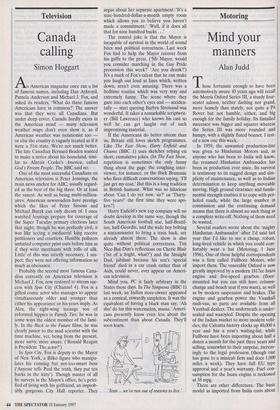Television
Canada calling
Simon Hoggart
An American magazine once ran a list of famous names, including Dan Aykroyd, Pamela Anderson and Michael J. Fox, and asked its readers, 'What do these famous Americans have in common?' The answer was that they were all Canadians. But under deep cover. Canada hardly exists in the American mind — many television weather maps don't even show it, as if American weather was isolationist too or else the country is vaguely treated as if it were a 51st state. We're not much better. The late Canadian Bernard Braden wanted to make a series about his homeland, simi- lar to Alistair Cooke's America, called God's Frozen People. The BBC said no.
One of the most successful Canadians on American television is Peter Jennings, the main news anchor for ABC, usually regard- ed as the best of the big three. Or at least the sanest. As well as being multi-million- aires, American newsreaders have prestige which the likes of Peter Sissons and Michael Buerk can only dream of. I once watched Jennings prepare for coverage of the Super Tuesday primary elections later that night; though he was perfectly civil, it was like seeing a mediaeval king receive petitioners and courtiers. Humble pollsters unfurled computer print-outs before him as if they were merchants with rolls of silk. Little of this was strictly necessary, I sus- pect; they were not offering information so much as obeisance.
Probably the second most famous Cana- dian currently on American television is Michael J. Fox, now restored to sitcom suc- cess with Spin City (Channel 4). Fox is a gifted comic actor who manages to appear simultaneously older and younger than either his appearance or his years imply. As Alex, the right-wing teenage son of reformed hippies in Family Ties, he was in some ways the oldest member of the fami- ly. In the Back to the Future films, he was clearly junior to the mad scientist with the time machine, yet, being from the present, more savvy, more aware. (`Ronald Reagan is President. The actor?') In Spin City, Fox is deputy to the Mayor of New York, a Bilko figure who manipu- lates his cunning but not-too-smart boss (Anyone tells Paul the truth, they put ten bucks in the kitty'). Though master of all he surveys in the Mayor's office, he's petri- fied of living with his girlfriend, an improb- ably gorgeous City Hall reporter. They argue about her separate apartment: 'It's a nine-hundred-dollar-a-month empty room which allows you to believe you haven't made a commitment."Well, if it does all that for nine hundred bucks ...'
The central joke is that the Mayor is incapable of survival in the world of sound bites and political correctness. Last week Fox had to help the Mayor recover from his gaffe to the press. (`Mr Mayor, would you consider marching in the Gay Pride procession this week?' Are you drunk?') It's a mark of Fox's talent that he can make you laugh out loud at lines which, written down, aren't even amusing. There was a bedtime routine which was very sexy and extremely funny. The scene where they gaze into each other's eyes and — acciden- tally — start quoting Barbra Streisand was wonderful. It takes a remarkable scriptwrit- er (Bill Lawrence) who knows his cast so well he can get laughs out of such unpromising material.
If the Americans do better sitcom than us, Britain still loves sketch programmes. Like The Fast Show, Harry Enfield and Chums (BBC 1) uses sketches relying on short, cumulative jokes. (In The Fast Show, repetition is sometimes the only funny thing about the gags: the coughing inter- viewer, for instance, or the thick Brummie who flees difficult conversations saying, just get my coat.' But this is a long tradition in British humour. What was so hilarious about 'Can I do yer now, sir?' of 'Thirty- five years!' the first time they were spo- ken?) Harry Enfield's new rep company will no doubt develop in the same way, though the South American football star, half-Brazil- ian, half-Geordie, and the wide boy bribing a stationmaster to bring a train back, are already almost there. The show is also quite without political correctness. Tim Nice-But-Dim's reflections on Cherie Blair (`bit of a fright, what?') and the Straight Dad, jubilant because his son's 'special friend' died in a car crash rather than of Aids, could never, ever appear on Ameri- can television.
Mind you, PC is fairly arbitrary in the States these days. In The Simpsons (BBC 1) last week, an Indian store-owner appeared as a comical, cowardly simpleton. It was the equivalent of having a black man say, `Ah sho' do luv this watermelon, =sm..' Ameri- cans presently know even less about the subcontinent than about Canada. They'll soon learn.
Jean ...we've run out of reasons to live.'


























































 Previous page
Previous page